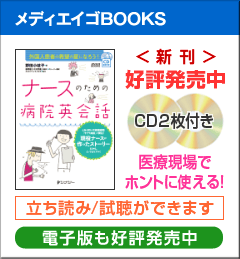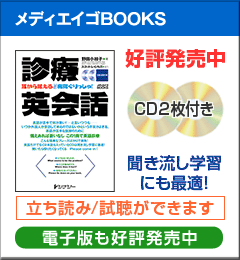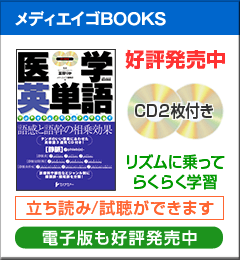

医学にも詳しいバイリンガル・パーソナリティのスマイリーが,ホットな話題を英語のニュースリリースを元に紹介する音声(ポッドキャスト)番組です。完全なネイティブではない,ちょっとくせのあるパワフル英語がやみつきになるかもしれませんよ。番組で取り上げるニュースリリースの全文も掲載しているので,ぜひご活用ください。
英語と日本語のチャンポンで不定期にお届けします。
Please enjoy this bilingual news program!
※iPhone, iPadでは「Download」をタップすると音声が出ます。
Jan. 21, 2013
No. 8
米国心臓協会年次学術集会より:複合ビタミンの摂取に過剰な期待は禁物!
複合ビタミンを毎日服用しても50歳以上男性の心血管リスクは減少せず(The Physicians' Health StudyⅡ)
|
Get the Flash Player to see this player.
|
 |
・multivitamin:複合ビタミン剤
・deficiency:欠乏
・dietary habits:食生活
【番組で取り上げた英文】
After more than 1,700 major cardiovascular disease events occurred during trial follow-up, we found that taking a daily multivitamin did not reduce their risk of major cardiovascular events, including heart attack, stroke and cardiovascular death.
Multivitamins are the most common supplement taken by at least one-third of all U.S. adults. While multivitamins are typically used to prevent vitamin and mineral deficiency, there is an unproven belief that they may have benefits on other chronic diseases, including heart attack, stroke or cardiovascular death.
The majority of men in our trial appeared to have, on average, good dietary habits. The question remains about how the long-term cardiovascular effects of daily multivitamin use might change among people with a wider range of nutritional status.
It’s also important to note that taking a daily multivitamin appears to be safe, with no harm found. In addition, it’s also important to consider other potential effects of long-term multivitamin use, including a modest reduction in total cancer recently reported in our trial.
【ニュースリリース全文】 ※番組で取り上げた箇所は太字になっています。
News Release from American Heart Association on November 5, 2012
A multivitamin a day doesn’t prevent cardiovascular disease in men
LOS ANGELES, Nov. 5, 2012 -- For men 50 and older, taking a multivitamin a day may not prevent heart disease.
That’s the finding of researchers who presented their late-breaking clinical trial at the American Heart Association’s Scientific Sessions 2012. Theirs is the first and only large-scale, long-term clinical trial examining daily multivitamin use and cardiovascular health. Other observational studies have netted inconsistent results.
The full manuscript for A Randomized Trial of a Multivitamin (MVM) in the Prevention of Cardiovascular Disease in Men: The Physicians’ Health Study (PHS) II is published in the Journal of the American Medical Association.
“Multivitamins are the most common supplement taken by at least one-third of all U.S. adults,” said Howard D. Sesso, Sc.D., M.P.H., lead researcher and Associate Professor of Medicine in the Division of Preventive Medicine at Brigham & Women’s Hospital in Boston, Mass. “While multivitamins are typically used to prevent vitamin and mineral deficiency, there is an unproven belief that they may have benefits on other chronic diseases, including heart attack, stroke or cardiovascular death.”
The results are from the Physicians’ Health Study II, a clinical trial of 14,641 U.S. male physicians who were aged 50 years and older. Most are Caucasian. Half of all participants took a common multivitamin daily; the other half took a placebo daily.
Researchers followed the physician participants for an average 11.2 years to determine if taking the multivitamin affected the occurrence of major cardiovascular events.
“After more than 1,700 major cardiovascular disease events occurred during trial follow-up, we found that taking a daily multivitamin did not reduce their risk of major cardiovascular events, including heart attack, stroke and cardiovascular death.
“It’s also important to note that taking a daily multivitamin appears to be safe, with no harm found. In addition, it’s also important to consider other potential effects of long-term multivitamin use, including a modest reduction in total cancer recently reported in our trial,” said J. Michael Gaziano, M.D., M.P.H., chief of the Division of Aging at Brigham and Women’s Hospital, and co-author of the study.
The American Heart Association suggests that the best way to get the right nutrients is to eat a healthy, balanced diet that is high in fruits and vegetables, fiber-rich whole grains, contains oily fish twice per week, is low in saturated fat and sodium and limited in added sugars and trans fats.
It’s not certain whether the findings would extend to younger men, women and other racial and ethnic groups, Sesso said.
“The majority of men in our trial appeared to have, on average, good dietary habits.” he said. “The question remains about how the long-term cardiovascular effects of daily multivitamin use might change among people with a wider range of nutritional status. Other healthy habits, such as smoking cessation and increased physical activity, remain effective tools in preventing cardiovascular disease and other outcomes.”
The National Institutes of Health funded the trial, along with an investigator-initiated grant from BASF Corporation. Pfizer provided the multivitamins and packaging, and DSM Nutritional Products, Inc. provided packaging.



